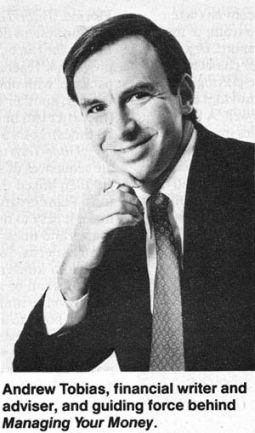The
Automatic Shoebox
A Conversation with Andrew Tobias
A Conversation with Andrew Tobias

Andrew Tobias has built a career-and a reputation-by writing clearly, and often wittily, about money. His books and articles fall roughly into two categories: those such as Fire and Ice (about Revlon head Charles Revson) and The Invisible Bankers (about the insurance industry), which deal, often investigatorily, with industries and issues; and those such as the well-known The Only Investment Guide You'll Ever Need and its recently published cousin, The Only OTHER Investment Guide You'll Ever Need, which offer financial advice. Recently Tobias has gathered nearly as much fame for software as for prose. Managing Your Money by Andrew Tobias, published by MECA (see the following Buyer's Guide for further details), is numbered among the more successful personal financial management packages on the software market. We asked Andrew Tobias to talk generally about the elements that make financial management software worthwhile for the average consumer.
COMPUTE! Is there a single overriding question that determines whether or not a financial management package will be effectivefor a consumer?
Tobias: Number one is: Will it be practical?
A program that just balances your checkbook is fine, but you really don't need it. It's not practical, any more than it has turned out to be practical to have a computer in your kitchen to help you figure out amounts and recipes. It's a clever idea, but it's probably not worthwhile.
In order for a financial management program to be practical, it probably ought to be integrated. If you go to the trouble of entering your various transactions, will you get other benefits than just being able to balance your checkbook?
COMPUTE! What other benefits are important?
Tobias: You ought to be able to get reports for doing your taxes. In fact, you ought to be able to keep track of how you stand for your budget, your tax estimation, and so on.
Automatically, once you've entered the data, it should have an impact on your taxes-it should have an impact on some sort of net worth or balance sheet statement so that, in essence, you can press a key and print out some kind of balance sheet for your banker. It should have an impact on cash forcasting, so you can spot months ahead when you may be running short of cash based on your current budget.
COMPUTE! Are there other elements consumers should consider when looking at the various financial management software packages on the market?
Tobias: The software should be reasonably friendly, so it's not too hard to learn. More important for this kind of software is the ease of data entry. If you're using the software every day or every week, for years, all the little conveniences that may seem like bells and whistles at first really become the sort of everyday bread and butter that determine whether or not the program is efficient or whether it's a real drag. And you really don't find this out until you've used the program for a while.
COMPUTE! Let's talk about that a while. How long does it last? There's a school of thought that argues that computerizing your finances really doesn't save any time.
Tobias: Look: You have to pay your bills, and you have to do your taxes, or prepare materials so your accountant can do the work. This already takes a long time.
Although it does take time to learn to use a financial management package, once you've learned it, at the very least, it takes no longer to pay your bills by typing the amounts into the keyboard. But if you don't pay your bills by computer, you can certainly save time at the end of the year in organizing your shoebox, in essence.
Given the time it takes to learn a program, let's assume that on balance you don't save any time at all when managing your finances. It already takes a fair amount of time to pay your bills. With a computer there should be, at the very least, no net increase in the amount of time it takes.
COMPUTE! How do you personally go about managing your finances?
Tobias: I have two pieces of equipment: my expensive computer and next to it my 15-cent manilla folder. When I receive bills, confirmation slips from my broker, insurance policies, receipts, and all that stuff, I throw them in the folder. Every so often I power up the computer and clean out the folder. I find it satisfying, so I do it quite often.
COMPUTE! But you don't have to.
Tobias: No. Really, you could probably do it twice a month.
COMPUTE! You think that, ultimately, the computer, even if used only as a sort of automatic shoebox, does save the home user some time when managing the budget?
Tobias: I think so. Not the first month or two. But once they really get going, I think they will save time.
And even if they don't, there are advantages.
COMPUTE! Such as?
Tobias: First, it happens to be a little more fun. Second, far more important, you're in control of your finances. At any given time you can see where you stand. The computer and software give you a reason and a structure for making a budget and a plan. [Financial writer] Venita Van Caspel has said, "Most people retire with nothing, not because they plan to fail, but because they fail to plan."
Having a structure like this makes it fun and gives you a reason to look at your net worth every so often and see how you're doing, and it gives you a look at your budget. It puts you in control of your finances and gives you a much better chance of being able to spot problems and organize your life so it doesn't just happen to you. It lets you have some say in what kind of future you have.
--Keith
Ferrell